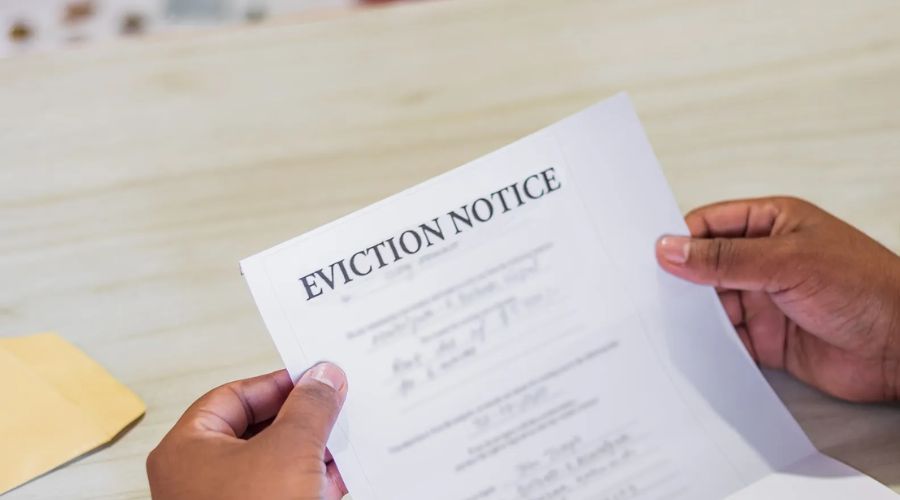The eviction process in Nebraska can feel overwhelming, especially when deadlines, notices, and court rules are involved. Landlords risk costly setbacks if even one step is missed, while tenants depend on the law to protect their rights. By knowing the required procedures and avoiding common errors, you can handle disputes more effectively. LeaseRunner’s article breaks down practical tips to help you move through Nebraska’s eviction laws with clarity and confidence.
Nebraska’s Foundational Legal Framework for Eviction
Before understanding the step-by-step eviction process in Nebraska, it is crucial to recognize the two primary statutes that govern landlord-tenant relationships. These laws set the foundation for how disputes are managed and how courts oversee the path to regaining possession.
Uniform Residential Landlord and Tenant Act (URLTA)
Nebraska’s URLTA (Neb. Rev. Stat. §§ 76-1401–76-1449) governs residential rentals statewide. It defines who is covered, excludes certain occupancies (e.g., hotels/motels, some institutional housing), and places landlord-tenant duties into statute. Courts with jurisdiction (county or district) enforce those rights.
URLTA also bars “self-help” lockouts and service shutoffs; possession must be recovered through a court action. These guardrails shape this eviction process by requiring formal notice, filing, service, hearing, and judgment before removal.
For nonpayment of rent, the URLTA requires a seven-day written notice. If the tenant does not pay within this period, the landlord may end the tenancy. In cases of repeat or serious violations, different timelines apply. After the notice period ends, the landlord must file an action for possession, often called “forcible entry and detainer.” From there, the process moves to summons, a court hearing, and—if the landlord wins—a writ of restitution.
These steps keep the eviction process in Nebraska courtroom-centered and notice-driven. Semantic keywords to aid readers: notice to quit, summons, action for possession, forcible entry and detainer, writ of restitution.

Mobile Home Landlord and Tenant Act
Manufactured-home lot rentals are regulated by the Mobile Home Landlord and Tenant Act (Neb. Rev. Stat. §§ 76-1450–76-14,111). URLTA does not cover renting a mobile-home space/lot; the Mobile Home Act fills that gap and sets its own requirements.
Rules that conflict with the Act are unenforceable. Practically, these provisions influence the eviction process for mobile-home communities by channeling disputes into the same court-supervised path (statutory notice, filing, service, judgment) but under a different substantive framework tailored to lot tenancies. Semantic keywords: mobile home lot tenancy, park rules, notice requirements, possession.
Legal Grounds for the Eviction in Nebraska
In Nebraska, it’s important to understand the specific reasons for the lease termination to effectively guide tenants and landlords during the eviction process. Below are the primary grounds for eviction in Nebraska.
Failure to pay rent on time
Rent becomes overdue the day after it is due. A landlord must provide a 7-day notice to pay or quit before moving forward. If the full rent payment is made within that period, the eviction process is halted. If not, the landlord can evict tenants with formal legal procedures in Court. Nebraska law (§76-1431) confirms this 7-day cure period.
Violation of the lease/rental agreement
When a lease violation occurs, the landlord issues a 14/30-day notice. Common violations include damage beyond normal wear and tear, keeping unauthorized pets, or breaking a no-smoking clause.
Once the notice is given, tenants have 14 days to fix the problem. If they do not, the tenancy will end 30 days from the date of the notice. This process ensures compliance with both tenant rights and landlord rights.
Conducting illegal activity
Engaging in criminal activity on a rental property — such as drug possession or distribution, illegal gambling, prostitution, or the unlawful possession of weapons — allows landlords to serve a 5-day notice to quit. Because of the safety risks, this ground moves quickly through the Court procedure, making it one of the fastest ways the eviction process can proceed.
Non-renewal of the lease after the rental period ends
If no violation exists, tenants can stay until the lease expires. After that, if they remain without renewal, landlords may issue a notice to vacate: 7 days for week-to-week or 30 days for month-to-month tenancies. Staying beyond the agreed period can lead to an unlawful detainer filing and continuation of the eviction process in Nebraska.
No-Fault Eviction
A no-fault eviction happens when the landlord ends the lease with proper notice, even without tenant wrongdoing. In these cases, tenant protections still apply, requiring written notice—usually 30 days for month-to-month arrangements. Though neutral, this step still follows the structure of the eviction process in Nebraska under current laws in the U.S.

Serving an Eviction Notice in Nebraska
State law requires proper notice of eviction to the tenant. The type of notice depends on the reason for removal, and each has strict timelines and language that must be followed to ensure compliance with legal procedures designed to balance both landlord and tenant interests.
Types of Notices
- 7-Day Notice to Pay or Quit for unpaid rent. Tenants have seven calendar days after written notice to pay in full or face termination.
- 14/30-Day Notice for Lease Breach (material noncompliance). Specify the violation; the renter gets 14 days to fix it, or the lease ends no sooner than day 30. A repeat of the same breach within six months allows a 14-day termination with no cure.
- 5-Day Unconditional Quit for violent or dangerous conduct or illegal drug activity on the premises. No right to cure.
- Periodic Tenancies: 7-day written notice for week-to-week; 30-day written notice for month-to-month.
What to Include in the Notice
Every notice must clearly state the property address, names of the parties, date of service, and landlord’s signature. For unpaid rent, the notice should specify the amount due and the deadline for payment. For lease violations, the notice must describe the specific acts or omissions and provide the cure period, following the guidelines on how to write an eviction notice.
In cases of dangerous or illegal conduct, the document should identify the behavior and confirm that no right to remedy is allowed. Being precise ensures the notice respects tenant rights while preserving landlord rights, making the eviction process in Nebraska enforceable in court.
How to Serve the Notice
The law requires delivery in a way that ensures the tenant receives the information. Acceptable methods include personal delivery to the tenant, handing it to someone of suitable age at the residence, or mailing it to the address used for correspondence.
Certified mail is often preferred for proof of service. Landlords should always retain copies of the notice and evidence of delivery to avoid delays. Consulting legal aid services can also help landlords or tenants understand their obligations during this eviction process.
Important Considerations
Accuracy and timing matter. Using the wrong notice type or failing to meet statutory deadlines can cause the case to be dismissed. Landlords should keep detailed records of notices sent, rent ledgers, and any communication with the tenant.
Proper service of notice is the foundation of the eviction process in Nebraska, ensuring that when a case reaches the court, the landlord’s claim is not weakened by procedural mistakes and that tenant protections are fully respected.
Step-by-Step Nebraska Eviction Procedure
Understanding the eviction process in Nebraska is essential for both landlords and tenants. Below is a clear step-by-step guide that walks you through each stage, from notice to regaining possession.
Step 1 – Serve Notice Properly
The eviction process always starts with delivering the right notice. For unpaid rent, a 7-day notice to pay or quit applies. For other breaches, landlords issue a 14-day cure notice with a 30-day termination date. Ending a periodic tenancy requires a 7-day notice for week-to-week or a 30-day notice for month-to-month rentals. These legal procedures ensure proper compliance before moving to court.
Step 2 – Filing a Complaint
If the tenant does not comply, the landlord files a forcible entry and detainer action in the county court where the rental property is located. Filing fees must be paid, and the case cannot move forward without this official step in the eviction process.
Step 3 – Serve the Legal Complaint
Once the court issues a summons and complaint, they must be served within three days. Service can be made personally, through certified mail, or left with someone of suitable age at the unit. This eviction check step ensures the tenant is formally notified of the pending case.
Step 4 – Wait for Tenant Response
Nebraska state laws do not require a written response. Instead, tenants are expected to appear at the hearing. Hearings are usually scheduled 10–14 days after the summons is issued, giving tenants about a week to prepare. If issues like breaking a lease or nonpayment are involved, the court will review the evidence during this stage of the eviction process in Nebraska.
Step 5 – Attend the Court Hearing
At the hearing, the landlord must present strong proof: the lease agreement, rent ledgers, photos, or witness testimony. If the tenant does not show up, judgment may be granted by default. Solid evidence is key when navigating Nebraska’s legal procedures for eviction.
Step 6 – Obtain a Writ of Restitution
If the landlord prevails, the court issues a Writ of Restitution, allowing the sheriff to enforce the order. Only law enforcement can physically remove a tenant, even in cases involving disputes over squatter rights.
Step 7 – Regain Possession of the Property
After issuance of the writ, tenants have 10 days to vacate the unit. If they fail to leave, the sheriff will proceed with removal. Landlords must avoid self-help actions and instead follow the court-supervised steps that complete the eviction process in Nebraska.

Eviction Timeline & Costs in Nebraska
Understanding the eviction process in Nebraska is crucial for both landlords and tenants. While every case may vary, the typical eviction timeline usually lasts about 4 to 8 weeks (30–57 days) from start to finish.
The stages below outline the process with their expected durations and common expenses, helping property owners prepare for legal steps, court involvement, and potential financial impact.
Required Documents for the Nebraska Eviction Process
When preparing for the eviction process in Nebraska, documentation wins cases. Organize clear, dated proof that ties every claim to the lease terms and your rent records. Keep everything in writing to align with Nebraska landlord-tenant law and courtroom expectations during the eviction process.
Best Practices for Record Keeping
Build a searchable digital archive for the eviction process: scan signed leases, notices, invoices, and correspondence; label files with dates; maintain off-site backups via secure cloud storage; and centralize data in property management software. Favor email or written messages over phone calls so your timeline is verifiable. This structure speeds filings and supports an unlawful detainer action if needed.
Evidence to show for not paying rent
For nonpayment claims in the eviction process, prepare:
- The executed lease agreement showing due dates and late terms.
- A complete rent ledger with all transactions.
- Payment receipts and bank proofs of NSF/chargebacks.
- Copies of a notice to quit or demand letters.
- Records of reminders sent (email, text, or letters) showing the tenant had time to cure before breaking a lease became grounds for removal.
Evidence to show for lease violations
For behavior-based breaches within the eviction process in Nebraska, provide time-stamped video, camera stills, or smartphone clips; high-resolution photos; and the precise lease clauses that prohibit the conduct (noise, unauthorized animals, damage). Visuals paired with the contract language make the violation easy to confirm.
Property Condition Documentation
Protect your position in the eviction process with condition proof:
- Dated move-in and move-out photos.
- Inspection notes, maintenance tickets, and repair invoices.
- Labeled files showing what qualifies as normal wear and tear versus actual damage.
- Consistent image records matched to rooms or fixtures to justify lawful security deposit deductions.

5 Tips to Avoid Common Eviction Mistakes
Even with clear laws, landlords often run into issues that slow down or complicate the eviction process in Nebraska. By keeping these five practical tips in mind, you can reduce costly errors and handle each step with confidence.
1. Provide the Correct Notice
One of the most frequent errors landlords make during the eviction process is failing to deliver the appropriate notice. State law requires specific forms, such as a 7-day notice for nonpayment of rent or a 30-day notice for lease termination.
Serving the wrong notice or missing details like the tenant’s name, property address, or deadline can result in the case being dismissed. Double-checking notice requirements helps you remain compliant and avoid unnecessary delays.
2. Document Every Step
To succeed in the eviction process, landlords should keep detailed records:
- Copies of the signed lease agreement
- Proof of rental payments and outstanding balances
- Written notices were served to the tenant
- Emails, letters, or texts related to disputes or reminders
Having this documentation strengthens your case during a court hearing and protects you from tenant claims.
3. Follow Legal Procedures Strictly
Attempting shortcuts, such as locking out a tenant or shutting off utilities, is considered “self-help eviction” and is illegal in Nebraska. To respect tenant rights and safeguard landlord responsibilities, you must file the appropriate paperwork with the court. Judges will dismiss cases if the landlord bypasses these legal procedures, no matter how clear the violation may seem. Always rely on the formal judicial process to enforce your rights.
4. Prepare for the Court Hearing
When the eviction process in Nebraska reaches the courtroom, preparation is key:
- Bring the lease agreement, payment history, and all notices
- Organize evidence in chronological order for clarity
- Remain professional and respectful when addressing the judge
- Anticipate possible tenant defenses and be ready with responses
Thorough preparation reduces the risk of delays or unfavorable outcomes.
5. Seek Legal Guidance When Needed
Eviction laws are complex, and even experienced landlords can make mistakes. Consulting with an attorney familiar with Nebraska rental laws ensures you are on solid ground. A legal professional can clarify notice periods, filing requirements, and courtroom expectations. By seeking advice early, you reduce the risk of errors that could extend the eviction process in Nebraska and increase costs.
Conclusion
Navigating the eviction process in Nebraska requires careful attention to detail and strict compliance with state laws. From serving the right notice to preparing evidence for court, each step can determine the outcome. By applying the right strategies and seeking guidance when needed, landlords can protect their investments while tenants maintain their legal rights. Staying informed ensures the process runs smoothly and minimizes risks for everyone involved.
FAQs
1. Do landlords need a court order to evict in Nebraska?
Yes, landlords cannot legally remove tenants without a court order. After serving the proper notice and filing a complaint, the landlord must attend a court hearing. If the judge rules in favor of the landlord, the court issues a writ of restitution. This document authorizes the sheriff to remove the tenant if they do not vacate voluntarily. Without a court order, any eviction attempt is unlawful under Nebraska law.
2. Can a landlord evict a tenant immediately in Nebraska?
No, immediate eviction is not allowed in Nebraska. Landlords must follow legal notice requirements and file an eviction action through the county court. Even in cases of severe lease violations, the tenant is entitled to notice and a chance to remedy the situation if the law allows. Attempting to evict a tenant without court involvement—such as changing locks or cutting utilities—is considered an illegal self-help eviction.
3. How long does the eviction process in Nebraska usually take?
The timeline depends on the reason for eviction and court scheduling. Generally, the process can take anywhere from three to six weeks. The landlord must first provide the required notice, then file a complaint with the county court if the tenant does not comply. After filing, a hearing is usually scheduled within 10–14 days. If the landlord wins, the tenant is typically ordered to vacate within a few days.



